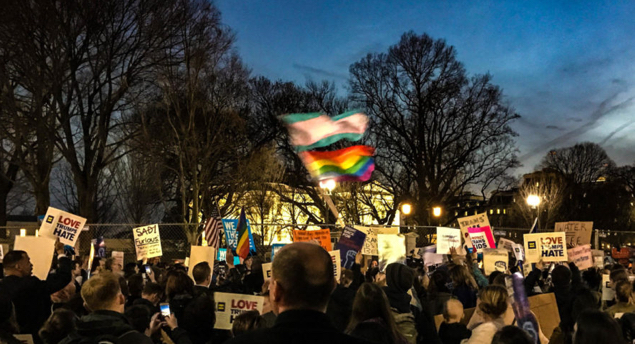Oppression and Expression
The struggle between queer youth and the US education system.
Can schools even afford to give their students a comprehensive education? With the passing of the Parental Rights in Education Bill, dubbed by critics the Don’t Say Gay Bill, Florida schools could be in some financial trouble. The bill would allow for parents to sue schools for any teachings they don’t agree with; more specifically, lessons around sexual orientation, gender identity, and sex education.
The bill would dissuade teachers from trying to give kids an education that discusses the nuances of history and even from offering their students support. As governor of Florida Ron DeSantis argues, if parents wanted their children to learn about sexual orientation and identity, they can teach that at home. The issue arises when parents don’t teach their children these things.
Kids that don’t have the opportunity to be supported by their parents may have previously been able to find support from teachers, but the bill would require teachers to notify parents for any health or support services that their child was given. This is incredibly dangerous for youth who feel unsafe coming out to their parents.
According to the Trevor Project, a non-profit suicide prevention organization for queer youth, LGBTQ youth are already four times more likely to attempt suicide than their peers due to the mistreatment they face. This will only be exacerbated by outing them to their parents.
Lake Merritt ‘23 says that “the ‘don’t say gay’ bill has made me feel incredibly disappointed in where our schools are in educating teens and children. In regards to my identity and those around me who have spoken up about it, the bill being embraced makes it hard to maintain the same respect I once had for my sexuality.”
This bill would teach kids that it’s shameful to be gay and trans, or even just to explore their identity. We’ve already determined that LGBTQ youth are more likely to attempt suicide, and these feelings of shame will only grow once this bills are implemented.
However, this is not just a Florida problem. The bill has taken other forms across the country. Many states have been searching for ways to limit the discussion of sexual orientation, gender identity, and critical race theory (CRT). The Tennessee HB 800 bill would prohibit any public or charter high schools in the state from promoting, normalizing, supporting, or addressing “lesbian, gay, bi-sexual, or transgender (LGBT) issues or lifestyle.”
This bill is gaining enough traction to pose a threat to young LGBTQ people and the danger cannot be overstated. Along with taking away their support systems, the ‘Don’t say Gay Bill’ will take away education for not only queer youth, but everyone.
Lake supposes “it could be argued that it allows for a parent to control what a child learns and absorbs, yet it merely causes division. In denying the option to learn about these activists, you are denying your child to a well-rounded education. In addition, you are only seeing these figures one dimensionally. Simply taking away the option of teaching students about the continuous impact of these activists due to their gender or sexuality, strips away every other part of their identities. With the passing of this law, children may never be given a rich education, or be given the pleasure of learning a spectrum of topics relating to their work.”
Parents have a right to input in their childrens’ education — but teachers have an undeniable obligation to provide tools and support for their students, an obligation that will be left unfulfilled because of this bill.

